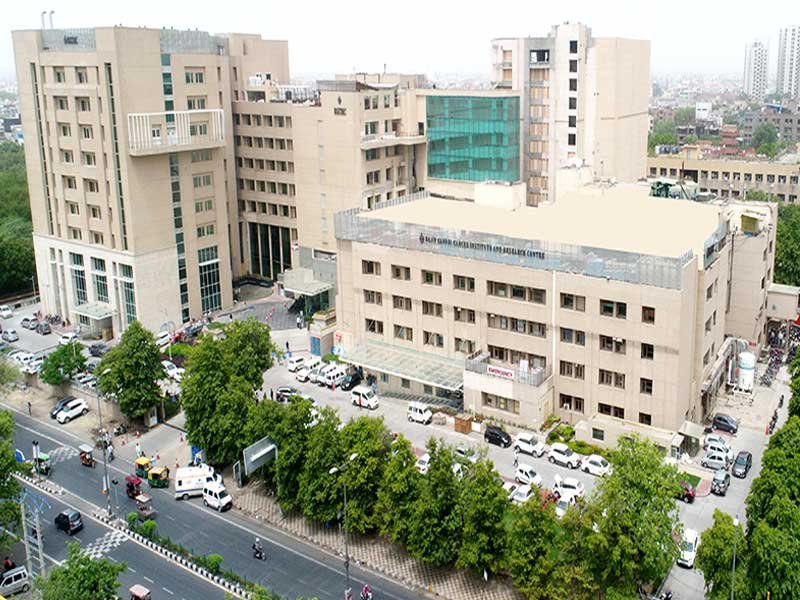Home Cost Orthopedics Robotic Knee Replacement

The cost of Robotic Knee Replacement in India varies between 8500-9000 USD.
India has gained recognition as a top-tier destination for robotic knee replacements, owing to its state-of-the-art technology that not only enhances surgical precision but also accelerates post-operative recovery.
The procedure involves cutting-edge advancements in orthopedic surgery, promising improved mobility and a higher quality of life.
Now, let's embark on an in-depth exploration of robotic knee replacement, delving into its remarkable success rates, post-surgery recovery tips, and more.
Robotic Knee Replacement utilizes advanced technology where a robotic arm aids surgeons in enhancing precision during knee replacement surgeries.
This technique involves the replacement of damaged knee tissue with an artificial joint, guided by a robotic arm for increased accuracy.
1. Cost-Effectiveness: India's robotic knee replacement ensures affordability, providing a significant cost advantage compared to developed countries.
2. Exceptional Success Rates: Renowned for its successful outcomes, patients experience remarkable symptom improvement and a higher quality of life.
3. Cutting-edge Healthcare: Access world-class care with advanced facilities and highly skilled healthcare professionals leveraging state-of-the-art technology.
4. Diverse Treatment Options: India offers a broad spectrum of medical solutions for various conditions, ensuring comprehensive healthcare choices.
5. Cultural Enrichment: Patients and families can enjoy a unique blend of medical treatment with the rich cultural experiences India has to offer.
1. Choice of Hospital: The selected hospital significantly influences the overall cost, with prestigious institutions often commanding higher fees.
2. Type of Hospital Room: Accommodation preferences, ranging from standard rooms to deluxe suites, play a role in cost variations.
3. Surgeon's Fees: The surgeon's experience and expertise may impact their professional fees.
4. Diagnostic and Testing Procedures: The cost may include expenses for pre-operative and post-operative diagnostic tests.
5. Post-operative Care Expenses: Costs related to recovery, including rehabilitation and follow-up care, contribute to the overall expenditure.
The success rate of Robotic Knee Replacement in India is around 99%.
After undergoing robotic knee replacement, patients can often resume their regular activities within 2 to 3 weeks, significantly reducing the overall recovery duration.
Most individuals regain their ability to walk normally within these three weeks. Initially, crutches may be necessary to maintain balance and a natural walking pattern during the initial stages of recovery.
As patients gradually regain their normal gait, they can discontinue using crutches, canes, or walkers.
| Robotic Knee Replacement cost | |
|---|---|
| Treatment Name | Estimated Cost |
| Robotic Knee Replacement | 8500-9000 USD |
The average cost of Robotic Knee Replacement in India is between 8500-9000 USD.
The success rate of Robotic Knee Replacement in India is around 99%.
1-5 days.
Patients often experience a quicker return to their routine, sometimes within just 2 to 3 weeks. This advanced procedure can significantly shorten the recovery period, allowing most individuals to regain their normal walking abilities within this timeframe.
In both robotic and traditional knee surgeries, similar risks exist. These include the chance of infection and stiffness during the procedure. You might also experience persistent discomfort afterward and face the possibility of implant failure.
You'll need to diligently perform prescribed exercises for at least two months. Afterward, additional workouts like stationary biking may be suggested to maintain knee flexibility and strengthen muscles.
Yes, it is necessary to have a companion.
It's advisable to wait for approximately 6 weeks before considering travel plans post-Robotic Knee Replacement surgery.
Yes, you can do your own research and choose your therapist.
You can use Paracetamol regularly to manage mild to moderate pain. Moderate pain can be managed using non-steroidal anti-inflammatory drugs (NSAIDs) like diclofenac or ibuprofen.
Yes, insurance will cover the cost of Robotic Knee Replacement in India.
To discover the top doctors or hospitals in India, you can visit our website, mejocare on the doctors' page, you can filter and find the finest doctors, while on the hospital page, you can identify the best hospitals. Additionally, you can reach out to us, and we will gladly offer you all the necessary suggestions and information you need.
It typically takes around 1 hour to complete.
No, there is no waiting list for Robotic Knee Replacement in India.
Your doctor might request several tests before or after your procedure. These tests include a Complete Blood Count (CBC), Urine analysis, Chest X-ray, Electrocardiogram (ECG), and Kidney Function Tests. They help assess various aspects of your health, like blood cell counts, kidney function, heart health, and overall body function.
Anesthesia is used to induce a sleep-like state without full unconsciousness. Propofol, a safe and fast-acting medication distinct from opioids, is commonly employed for deep sedation. Its effects wear off quickly, ensuring you'll likely forget the procedure afterward.
Typically, it's advisable to consider returning within a span of 6 to 8 weeks.
Constipation after surgery due to medications like opioids can be managed with specific foods. Avoid cheese, processed and sugary foods, red meat, and full-fat dairy to ease constipation.
After surgery, it's crucial to monitor your vitals, care for your wounds, manage any complications, attend rehabilitation services, and follow up with your healthcare team.

Orthopedics and Joint Replacement Surgeon
18+ Years of Experience

Orthopedic & Joint Replacement Surgeon
35+ Years of Experience

Beds: 539
New Delhi

Beds: 230
New Delhi

Beds: 710
New Delhi

Beds: 650
New Delhi

Beds: 191
New Delhi

Beds: 310
New Delhi

Beds: 299
Gurugram

Beds: 380
New Delhi

Beds: 402
New Delhi

Beds: 1300+
Gurugram

Beds: 1000
New Delhi

Beds: 500
New Delhi

Beds: 450
Faridabad

Beds: 675
New Delhi

Beds: 500
New Delhi
Our care team can help you.
